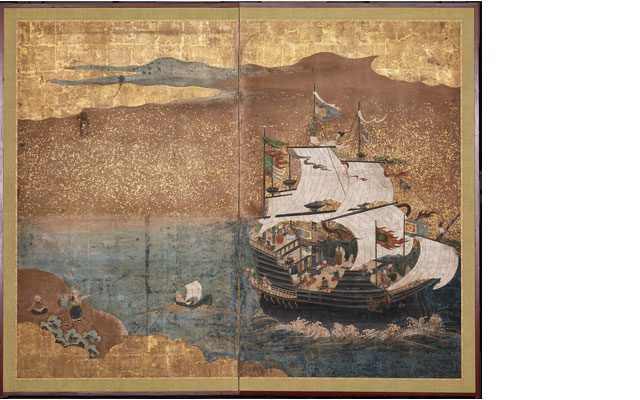
Date/Time
Friday, May 3, 2019
9:30 am PDT – 4:45 pm PDT
Location
UCLA William Andrews Clark Memorial Library
2520 Cimarron Street
Core Program 2018–19
Making Worlds: Art, Materiality, and Early Modern Globalization
Conference 3: Other Worlds
—organized by Bronwen Wilson (UCLA) and Angela Vanhaelen (McGill University)
co-sponsored by the Social Sciences and Humanities Research Council of Canada (SSHRC) Insight Grant
Narratives of colonialism, empire building, and religious mission—of center, periphery, and globalization—have been under revision in recent years in order to nuance our understanding of what were immensely complex and multi-faceted phenomena. The Clark Library’s 2018–19 Core Program will shift the focus from governing regimes and institutions to ways in which creative forms and practices were intertwined in the dynamics of materiality and early modern globalism. Such a proposition directs analysis toward the flow of materials, artifacts, and motifs across borders and bodies of water. It attends to experimentation that activated and responded to this traffic in things; it investigates these interactions as constant, on-going processes, thereby bringing innovation, ornamentation, improvisation, and sensation to the fore.
Such interactions were given impetus by an efflorescence of cosmopolitan spaces in the seventeenth and eighteenth centuries. These are cities, ports, exhibition sites, ships, caravanserais, markets, museums, theaters, and warehouses. They are spaces that are open to becoming something new, provisional instead of fixed in their form; they are not inherently hierarchical nor merely commercial, but inflected by global relations of power; they are spaces in which distance and presence are brought into consideration with each other. They are spaces through which people of diverse ethnicities, faiths, and vocational interests came and went. Allowing for convergences, reorientations, and interconnections, cosmopolitan spaces propelled people and artifacts in unexpected directions, giving rise to new ways of thinking.
Having examined the potential for creative interaction to which “in between spaces” and “material flows” across geographies gave rise, Conference 3 turns to “other worlds.” These are imaginary places, such as utopias and paradises; sites, like Jerusalem, that have been recreated elsewhere; travel narratives; costumes, performances, and ballets, such as Ben Jonson’s Masque of Blackness (1605) and Daniel Rabel’s designs for Americans for René Bordier’s Ballet de la Douairière de Billebahaut (1626); and representations of terrestrial and astronomical imagery. Papers will consider ways in which literary, theatrical, theological, mythological, architectural, and geographical forms became loci for imagining and inventing other worlds.
Image
Southern Barbarian (Nanban-jin) Boat
Formerly attributed to Kano School (Japanese)
17th century. Courtesy of Museum of Fine Arts, Boston
Speakers
Giancarlo Casale, European University Institute/University of Minnesota
Elisa Antonietta Daniele, Ahmanson-Getty Postdoctoral Fellow
Silvia Evangelisti, University of East Anglia
Emine Fetvaci, Boston University
Gavin Hollis, Hunter College, CUNY
José R. Jouve-Martín, McGill University
Kristopher W. Kersey, University of California, Los Angeles
Marjorie Rubright, University of Massachusetts, Amherst
J.B. Shank, University of Minnesota
Helen Smith, University of York
Program
9:00 a.m.
Morning Coffee and Registration
9:30 a.m.
Helen Deutsch, University of California, Los Angeles
Welcome
Bronwen Wilson, University of California, Los Angeles
Angela Vanhaelen, McGill University
Opening Remarks
9:45 a.m.
Session 1
Chair: Laura Hutchingame, Ph.D. Student, University of California, Los Angeles
Giancarlo Casale, European University Institute/University of Minnesota
“Reading Ruscelli in Istanbul: An Ottoman Madrasa Professor’s Encounter with a Venetian Globe-making Manual”
10:15 a.m.
Gavin Hollis, Hunter College, CUNY
“’The end of all’: Maps and Memento Mori in Early Modern England”
10:45 a.m.
Discussion
11:15 a.m.
Coffee Break
11:30 a.m.
Session 2
Chair: Sarah Carter, Ph.D. Candidate, McGill University
Emine Fetvaci, Boston University
“The World Visualized in an Imperial Ottoman Album”
12:00 p.m.
José R. Jouve-Martín, McGill University
“Lost Worlds and Recovered Codices: Lord Kingsborough, Ancient Mesoamerica, and the Creation of the Book Mexican Antiquities (1830–1848)”
12:30 p.m.
Discussion
1:00 p.m.
Lunch
2:15 p.m.
Session 3
Chair: Payton Phillips Quintanilla, Ahmanson-Getty Postdoctoral Fellow
Silvia Evangelisti, University of East Anglia
“Imagining Places and Conversions in Early Modern Spain and the Spanish Empire”
2:45 p.m.
Elisa Antonietta Daniele, Ahmanson-Getty Postdoctoral Fellow
“Drawing Worlds ‘In smoke and powder’: Bodies and Trifles in Il Tabacco, the Courtly Ballet Staged in Turin (1650)”
3:15 p.m.
Discussion
3:45 p.m.
Break
4:00 p.m.
Helen Smith, University of York
“Cheese, Eggs, and (Francis) Bacon: World-making and the Culinary Imagination in Early Modern England”
4:30 p.m.
Discussion
4:45 p.m.
Reception
After booking Day 1 below please remember to also book your spot for Day 2.
Booking Form
Bookings are currently closed for this event.

